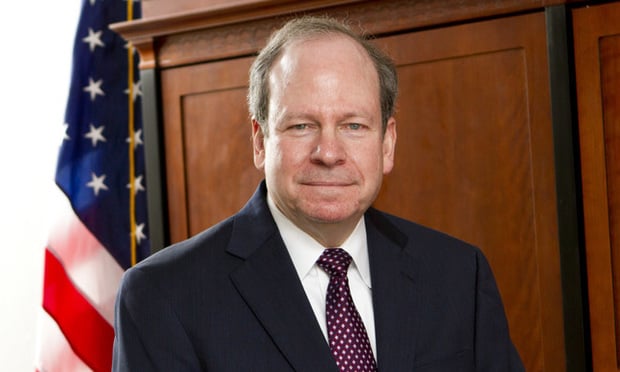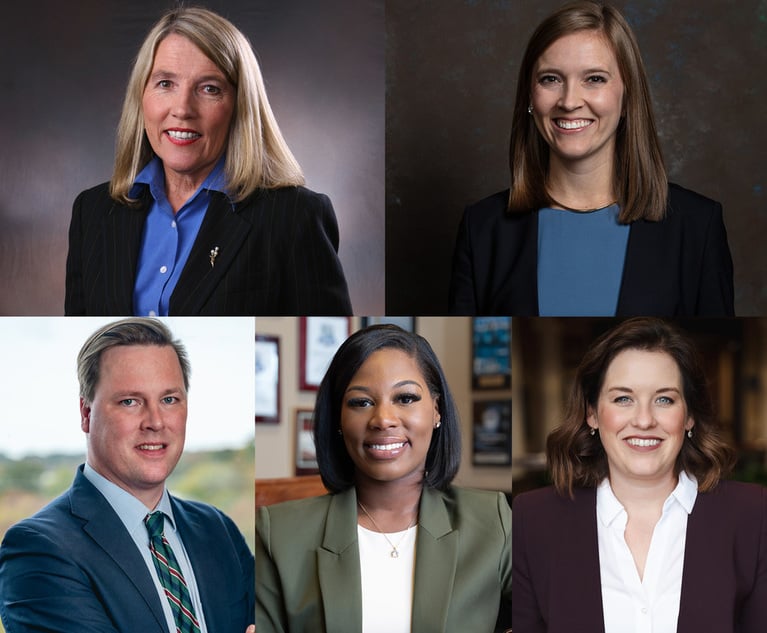'Questions for the Bench': Judge Mark Cohen of the U.S. District Court
"If I could mandate one change in the practice of law, it would be to ban the use of e-mail communication between civil practitioners."
March 18, 2019 at 06:48 PM
7 minute read
 Judge Mark Cohen, U.S. District Court for the Northern District of Georgia (Courtesy photo)
Judge Mark Cohen, U.S. District Court for the Northern District of Georgia (Courtesy photo)
Our next subject for “Questions for the Bench” is Judge Mark Cohen of the U.S. District Court for the Northern District of Georgia. He worked in the state attorney general's office, for Gov. Zell Miller and for Troutman Sanders before being nominated in 2014 by President Barack Obama.
What prompted you to become a lawyer? I grew up in South Florida, and my father (who was not an attorney) used to take me to see hearings and trials in the Dade County Courthouse because of his respect for the practice of law. That, and seeing Gregory Peck in the role of Atticus Finch in “To Kill a Mockingbird,” certainly contributed to my desire to become a lawyer.
What prompted you to seek a job on the bench? The desire to return to the public sector and use my experience as a 35-year practitioner to be the type of judge who effectively and efficiently manages litigation while not getting in the way of (good) lawyers arguing their own cases.
What do you like most about being a judge? The privilege of resolving disputes and dispensing justice makes me proud every morning when I walk into the federal courthouse. I love my job and the men and women I get to work with every day.
What keeps you up at night? A sentencing that is scheduled for the next day or one that may have occurred earlier that same day. The toughest role for any judge is deciding what an appropriate sentence is for a particular criminal defendant. The ability to deprive someone of their freedom is a sobering responsibility, and it should always be the most difficult thing any judge has to do. While I am comfortable with my decision-making process and the time it takes me to get to a final result, there still are instances where I struggle with the outcome. That said, if this ever gets too easy for me, it's probably time to do something else.
What are your pet peeves in briefs, arguments and trial practice? At the top of the list are lawyers who refuse to consent to requests for reasonable extensions of time because “my client told me not to consent to the extension.” Part of being an attorney is managing one's own clients and telling them that some disputes do not rise to the level of requiring court assistance. It also is stunning how many lawyers fail to read the Local Rules or the judge's Standing Order setting forth the procedure for litigating cases in that court. Finally, attorneys increasingly are trying to seal way too many documents that are filed in civil cases. The docket is presumed to be public and, when protection is sought, redactions should be limited to personal or confidential information that is authorized to be sealed.
How do you see your role, if any, in encouraging civil settlements or plea bargains? I don't actively encourage either. Of course, with respect to criminal cases, Rule 11 of the Federal Rules of Criminal Procedure bars a federal judge's participation in plea discussions, and I believe it would be an appearance of impropriety for me even to encourage such discussions. With respect to civil cases, I don't encourage settlement, although I will advise parties of the option to mediate the case with one of our magistrate judges.
When I was a practicing attorney, I did not take kindly to a trial judge “encouraging” (which sometimes meant brow-beating) the lawyers to settle a case. Sitting now as a trial judge, I take the view is that it's not my case; It's the parties' case and the parties' ultimate decision whether it should be settled. On rare occasions, I have called in both parties and attorneys to a hearing when it appears to me that personal animus has impeded the litigation. My purpose in those situations is to make sure the parties themselves know how the case is proceeding, what will occur at a trial and what other options may be available. This often succeeds in reducing the level of rancor and getting the parties to consult with one another, which can lead to a settlement.
Do disputes over discovery look different from the bench as opposed to when you were advocating for a client? Absolutely. I must have lived a charmed existence in my practice of law, because I do not recall having the number and intensity of civil discovery disputes that are present in my court. Come to think of it, the term “civil discovery” has become an oxymoron. If I could mandate one change in the practice of law, it would be to ban the use of e-mail communication between civil practitioners. The days of actually calling someone to discuss an issue (or, better yet, actually meeting with opposing counsel in someone's office) apparently have gone the way of the slide rule.
I prohibit motions to compel discovery and, instead, manage discovery disputes via teleconference with the affected lawyers. I am able to resolve these disputes more than 95 percent of the time. It's not that I am particularly wise; it's just that I get lawyers to talk to each other in lieu of tossing e-mail and text bombs back and forth. “Civility” is a concept that needs to be re-discovered in the legal profession, as well as in life, in my humble opinion.
What characteristic(s) do successful advocates before you share? Being well-prepared, addressing legal issues in a thorough and concise fashion, and maintaining professionalism with both the court and one's adversaries. At trial, making the most objections doesn't win over the judge or the jury. Even when an objection may have technical merit, a lawyer should first ask, “did the testimony hurt my case?” If the answer is no, then staying firmly planted in your chair is often the best approach.
What trial judge would you like to emulate and why? I am fortunate to serve with some excellent judges, but one who always stood as a model for me is Harold Murphy. If I had to define the term, “judicial temperament” for a legal dictionary, I would just insert Judge Murphy's photograph. During his unparalleled judicial career, he has been a shining example for how lawyers and litigants should be treated in a courtroom and how jurists should determine cases pending before them.
We understand that growing up in South Florida you became a bit of a space junkie. What interested you in the space program, and what do you think of the shift from government-run to privately-run space travel?
Oh, if I could only have been an astronaut. I followed the Mercury, Gemini and Apollo programs with fervor and went to several launches. The space program united not only all Americans but people all over the world. It fulfilled President Kennedy's vision and provided President Nixon with one of his most memorable statements when speaking to Neil Armstrong and Buzz Aldrin after they set foot on the moon: “For one priceless moment in the whole history of man, all the people on this Earth are truly one.” Wish we could hear and feel that today. I'm saddened that the government has pretty much abandoned the space program. People forget that much of the technology we take for granted today had its origins in the development of space travel. I understand there is a cost and potential danger, but humans have been explorers throughout history, and I sincerely hope we join as a nation in exploring that frontier again.
Related
Questions for the Bench: Judge Elizabeth Gobeil of the Georgia Court of Appeals
Questions for the Bench: Judge Steve Goss of the Georgia Court of Appeals
This content has been archived. It is available through our partners, LexisNexis® and Bloomberg Law.
To view this content, please continue to their sites.
Not a Lexis Subscriber?
Subscribe Now
Not a Bloomberg Law Subscriber?
Subscribe Now
NOT FOR REPRINT
© 2025 ALM Global, LLC, All Rights Reserved. Request academic re-use from www.copyright.com. All other uses, submit a request to [email protected]. For more information visit Asset & Logo Licensing.
You Might Like
View All

Plaintiffs Attorneys Awarded $113K on $1 Judgment in Noise Ordinance Dispute
4 minute read
'Didn't Notice Patient Wasn't Breathing': $13.7M Verdict Against Anesthesiologists
12 minute readTrending Stories
Who Got The Work
J. Brugh Lower of Gibbons has entered an appearance for industrial equipment supplier Devco Corporation in a pending trademark infringement lawsuit. The suit, accusing the defendant of selling knock-off Graco products, was filed Dec. 18 in New Jersey District Court by Rivkin Radler on behalf of Graco Inc. and Graco Minnesota. The case, assigned to U.S. District Judge Zahid N. Quraishi, is 3:24-cv-11294, Graco Inc. et al v. Devco Corporation.
Who Got The Work
Rebecca Maller-Stein and Kent A. Yalowitz of Arnold & Porter Kaye Scholer have entered their appearances for Hanaco Venture Capital and its executives, Lior Prosor and David Frankel, in a pending securities lawsuit. The action, filed on Dec. 24 in New York Southern District Court by Zell, Aron & Co. on behalf of Goldeneye Advisors, accuses the defendants of negligently and fraudulently managing the plaintiff's $1 million investment. The case, assigned to U.S. District Judge Vernon S. Broderick, is 1:24-cv-09918, Goldeneye Advisors, LLC v. Hanaco Venture Capital, Ltd. et al.
Who Got The Work
Attorneys from A&O Shearman has stepped in as defense counsel for Toronto-Dominion Bank and other defendants in a pending securities class action. The suit, filed Dec. 11 in New York Southern District Court by Bleichmar Fonti & Auld, accuses the defendants of concealing the bank's 'pervasive' deficiencies in regards to its compliance with the Bank Secrecy Act and the quality of its anti-money laundering controls. The case, assigned to U.S. District Judge Arun Subramanian, is 1:24-cv-09445, Gonzalez v. The Toronto-Dominion Bank et al.
Who Got The Work
Crown Castle International, a Pennsylvania company providing shared communications infrastructure, has turned to Luke D. Wolf of Gordon Rees Scully Mansukhani to fend off a pending breach-of-contract lawsuit. The court action, filed Nov. 25 in Michigan Eastern District Court by Hooper Hathaway PC on behalf of The Town Residences LLC, accuses Crown Castle of failing to transfer approximately $30,000 in utility payments from T-Mobile in breach of a roof-top lease and assignment agreement. The case, assigned to U.S. District Judge Susan K. Declercq, is 2:24-cv-13131, The Town Residences LLC v. T-Mobile US, Inc. et al.
Who Got The Work
Wilfred P. Coronato and Daniel M. Schwartz of McCarter & English have stepped in as defense counsel to Electrolux Home Products Inc. in a pending product liability lawsuit. The court action, filed Nov. 26 in New York Eastern District Court by Poulos Lopiccolo PC and Nagel Rice LLP on behalf of David Stern, alleges that the defendant's refrigerators’ drawers and shelving repeatedly break and fall apart within months after purchase. The case, assigned to U.S. District Judge Joan M. Azrack, is 2:24-cv-08204, Stern v. Electrolux Home Products, Inc.
Featured Firms
Law Offices of Gary Martin Hays & Associates, P.C.
(470) 294-1674
Law Offices of Mark E. Salomone
(857) 444-6468
Smith & Hassler
(713) 739-1250







